ENTREPRENEURSHIP AND SMALL BUSINESS MANAGEMENT: A Report
VerifiedAdded on 2021/02/20
|15
|3766
|36
Report
AI Summary
This report delves into the multifaceted world of entrepreneurship and small business management. It begins by defining entrepreneurship and exploring various venture types, including private, micro, small, medium, and large ventures, along with their characteristics and examples. The report also examines the similarities and differences between these ventures, providing a comparative analysis. Furthermore, it presents relevant data and statistics to illustrate the significant impact of micro and small businesses on the economy, including their contribution to employment and turnover. The importance of small businesses and business start-ups to the growth of the social economy is also discussed, highlighting their local benefits, innovation, and role in creating employment and fostering social purposes. The report concludes by outlining the key characteristic traits and skills of successful entrepreneurs, differentiating them from business managers through examples like Larry Page and Bill Gates, emphasizing creativity and risk-taking as crucial attributes.
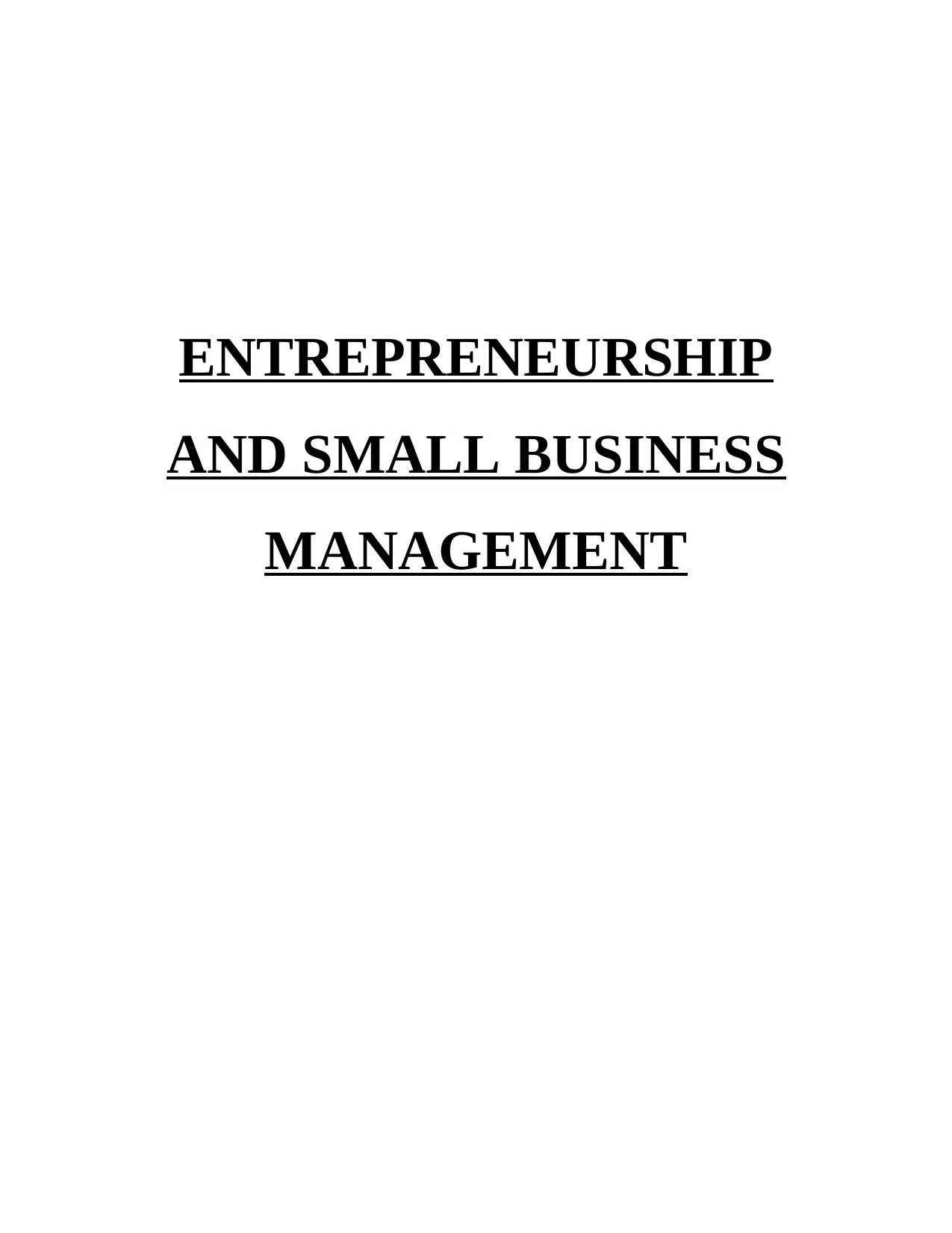
ENTREPRENEURSHIP
AND SMALL BUSINESS
MANAGEMENT
AND SMALL BUSINESS
MANAGEMENT
Paraphrase This Document
Need a fresh take? Get an instant paraphrase of this document with our AI Paraphraser
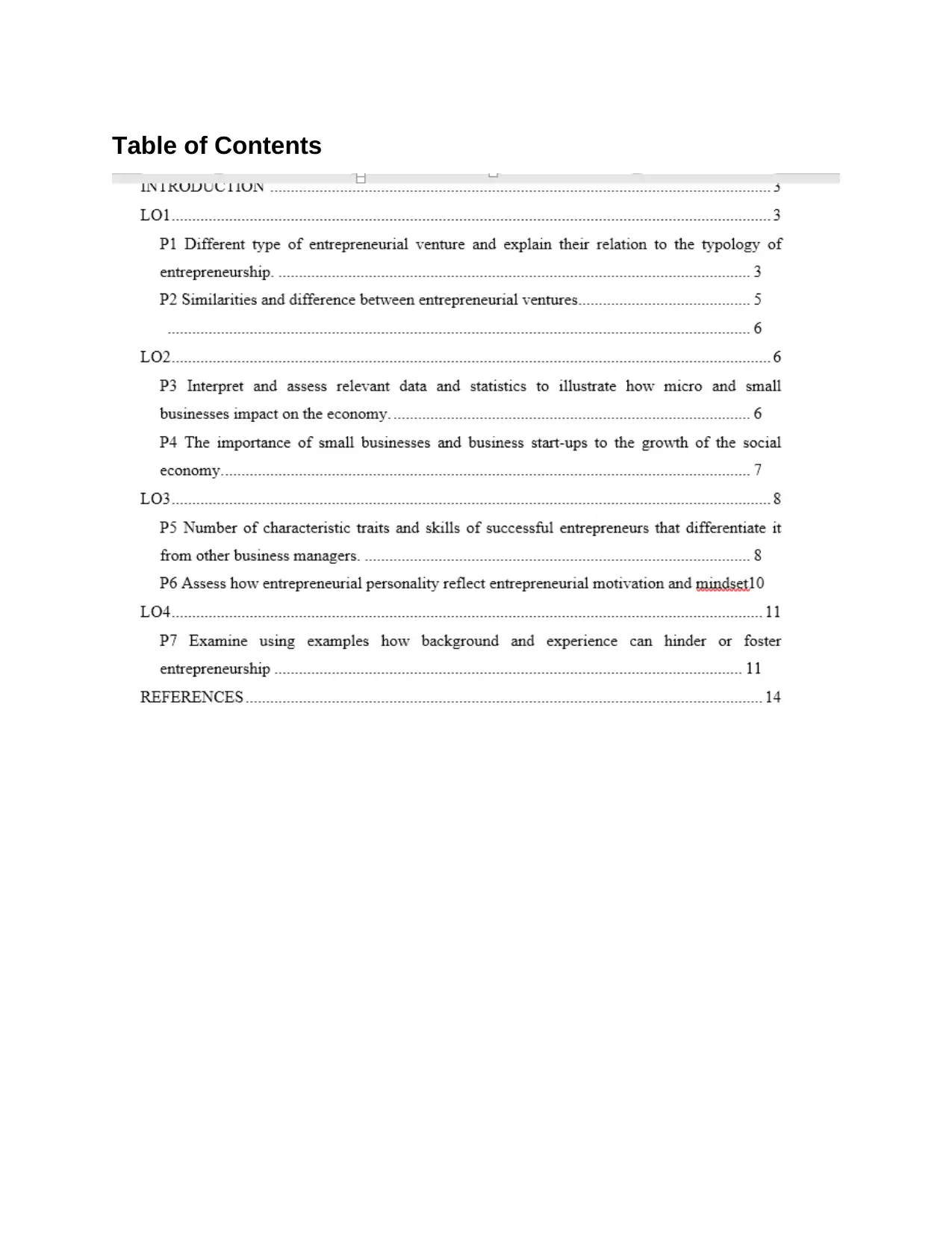
Table of Contents
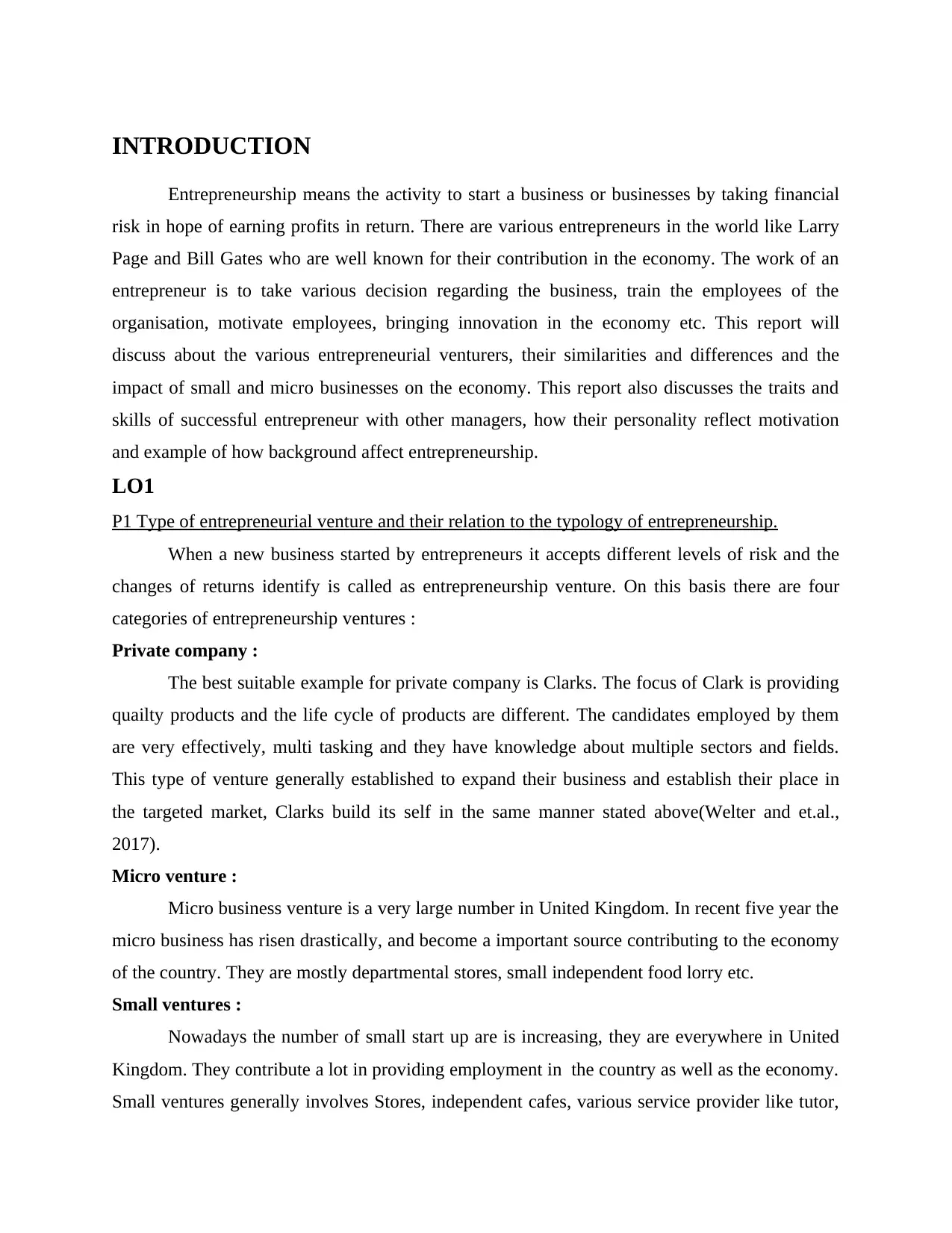
INTRODUCTION
Entrepreneurship means the activity to start a business or businesses by taking financial
risk in hope of earning profits in return. There are various entrepreneurs in the world like Larry
Page and Bill Gates who are well known for their contribution in the economy. The work of an
entrepreneur is to take various decision regarding the business, train the employees of the
organisation, motivate employees, bringing innovation in the economy etc. This report will
discuss about the various entrepreneurial venturers, their similarities and differences and the
impact of small and micro businesses on the economy. This report also discusses the traits and
skills of successful entrepreneur with other managers, how their personality reflect motivation
and example of how background affect entrepreneurship.
LO1
P1 Type of entrepreneurial venture and their relation to the typology of entrepreneurship.
When a new business started by entrepreneurs it accepts different levels of risk and the
changes of returns identify is called as entrepreneurship venture. On this basis there are four
categories of entrepreneurship ventures :
Private company :
The best suitable example for private company is Clarks. The focus of Clark is providing
quailty products and the life cycle of products are different. The candidates employed by them
are very effectively, multi tasking and they have knowledge about multiple sectors and fields.
This type of venture generally established to expand their business and establish their place in
the targeted market, Clarks build its self in the same manner stated above(Welter and et.al.,
2017).
Micro venture :
Micro business venture is a very large number in United Kingdom. In recent five year the
micro business has risen drastically, and become a important source contributing to the economy
of the country. They are mostly departmental stores, small independent food lorry etc.
Small ventures :
Nowadays the number of small start up are is increasing, they are everywhere in United
Kingdom. They contribute a lot in providing employment in the country as well as the economy.
Small ventures generally involves Stores, independent cafes, various service provider like tutor,
Entrepreneurship means the activity to start a business or businesses by taking financial
risk in hope of earning profits in return. There are various entrepreneurs in the world like Larry
Page and Bill Gates who are well known for their contribution in the economy. The work of an
entrepreneur is to take various decision regarding the business, train the employees of the
organisation, motivate employees, bringing innovation in the economy etc. This report will
discuss about the various entrepreneurial venturers, their similarities and differences and the
impact of small and micro businesses on the economy. This report also discusses the traits and
skills of successful entrepreneur with other managers, how their personality reflect motivation
and example of how background affect entrepreneurship.
LO1
P1 Type of entrepreneurial venture and their relation to the typology of entrepreneurship.
When a new business started by entrepreneurs it accepts different levels of risk and the
changes of returns identify is called as entrepreneurship venture. On this basis there are four
categories of entrepreneurship ventures :
Private company :
The best suitable example for private company is Clarks. The focus of Clark is providing
quailty products and the life cycle of products are different. The candidates employed by them
are very effectively, multi tasking and they have knowledge about multiple sectors and fields.
This type of venture generally established to expand their business and establish their place in
the targeted market, Clarks build its self in the same manner stated above(Welter and et.al.,
2017).
Micro venture :
Micro business venture is a very large number in United Kingdom. In recent five year the
micro business has risen drastically, and become a important source contributing to the economy
of the country. They are mostly departmental stores, small independent food lorry etc.
Small ventures :
Nowadays the number of small start up are is increasing, they are everywhere in United
Kingdom. They contribute a lot in providing employment in the country as well as the economy.
Small ventures generally involves Stores, independent cafes, various service provider like tutor,
⊘ This is a preview!⊘
Do you want full access?
Subscribe today to unlock all pages.

Trusted by 1+ million students worldwide
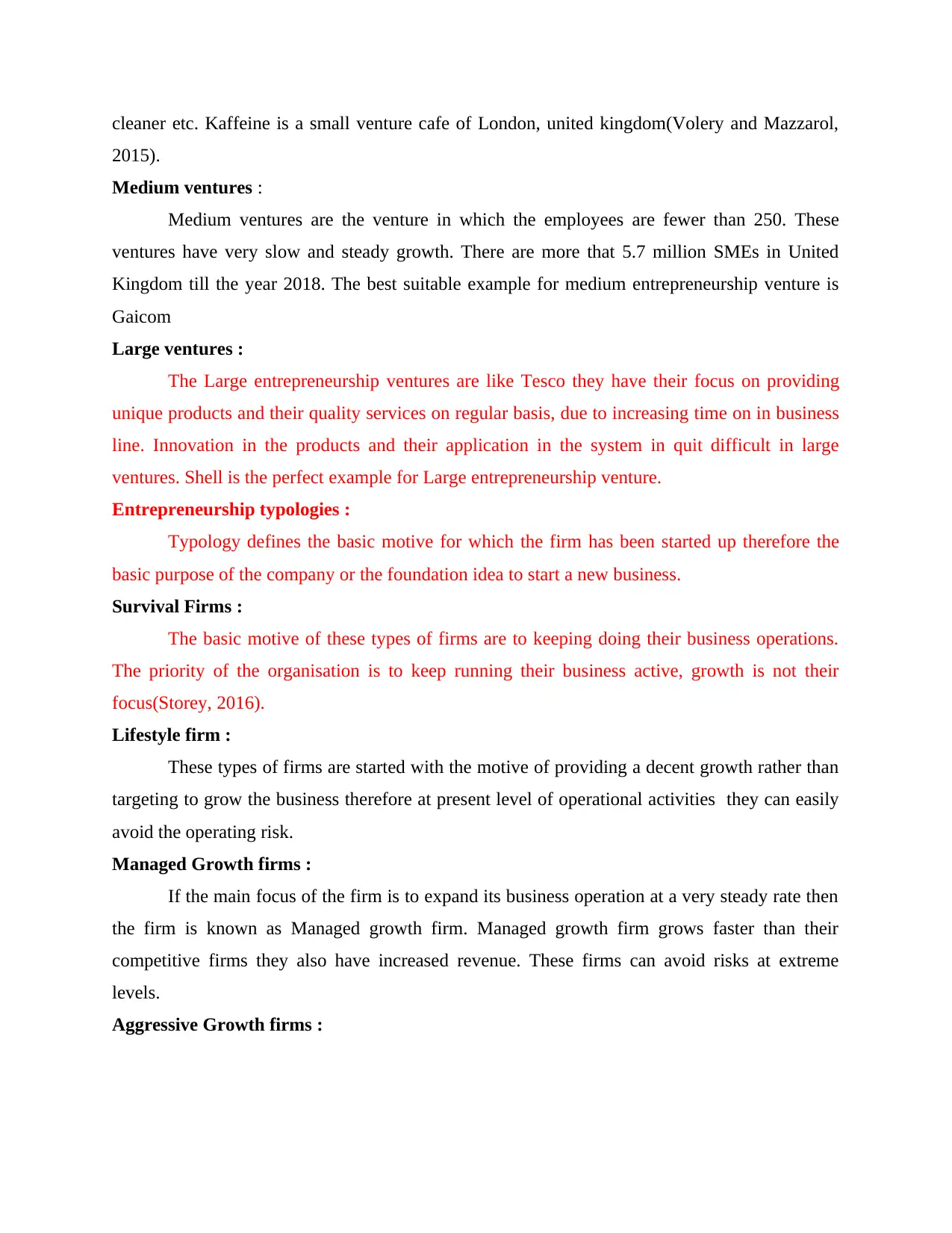
cleaner etc. Kaffeine is a small venture cafe of London, united kingdom(Volery and Mazzarol,
2015).
Medium ventures :
Medium ventures are the venture in which the employees are fewer than 250. These
ventures have very slow and steady growth. There are more that 5.7 million SMEs in United
Kingdom till the year 2018. The best suitable example for medium entrepreneurship venture is
Gaicom
Large ventures :
The Large entrepreneurship ventures are like Tesco they have their focus on providing
unique products and their quality services on regular basis, due to increasing time on in business
line. Innovation in the products and their application in the system in quit difficult in large
ventures. Shell is the perfect example for Large entrepreneurship venture.
Entrepreneurship typologies :
Typology defines the basic motive for which the firm has been started up therefore the
basic purpose of the company or the foundation idea to start a new business.
Survival Firms :
The basic motive of these types of firms are to keeping doing their business operations.
The priority of the organisation is to keep running their business active, growth is not their
focus(Storey, 2016).
Lifestyle firm :
These types of firms are started with the motive of providing a decent growth rather than
targeting to grow the business therefore at present level of operational activities they can easily
avoid the operating risk.
Managed Growth firms :
If the main focus of the firm is to expand its business operation at a very steady rate then
the firm is known as Managed growth firm. Managed growth firm grows faster than their
competitive firms they also have increased revenue. These firms can avoid risks at extreme
levels.
Aggressive Growth firms :
2015).
Medium ventures :
Medium ventures are the venture in which the employees are fewer than 250. These
ventures have very slow and steady growth. There are more that 5.7 million SMEs in United
Kingdom till the year 2018. The best suitable example for medium entrepreneurship venture is
Gaicom
Large ventures :
The Large entrepreneurship ventures are like Tesco they have their focus on providing
unique products and their quality services on regular basis, due to increasing time on in business
line. Innovation in the products and their application in the system in quit difficult in large
ventures. Shell is the perfect example for Large entrepreneurship venture.
Entrepreneurship typologies :
Typology defines the basic motive for which the firm has been started up therefore the
basic purpose of the company or the foundation idea to start a new business.
Survival Firms :
The basic motive of these types of firms are to keeping doing their business operations.
The priority of the organisation is to keep running their business active, growth is not their
focus(Storey, 2016).
Lifestyle firm :
These types of firms are started with the motive of providing a decent growth rather than
targeting to grow the business therefore at present level of operational activities they can easily
avoid the operating risk.
Managed Growth firms :
If the main focus of the firm is to expand its business operation at a very steady rate then
the firm is known as Managed growth firm. Managed growth firm grows faster than their
competitive firms they also have increased revenue. These firms can avoid risks at extreme
levels.
Aggressive Growth firms :
Paraphrase This Document
Need a fresh take? Get an instant paraphrase of this document with our AI Paraphraser
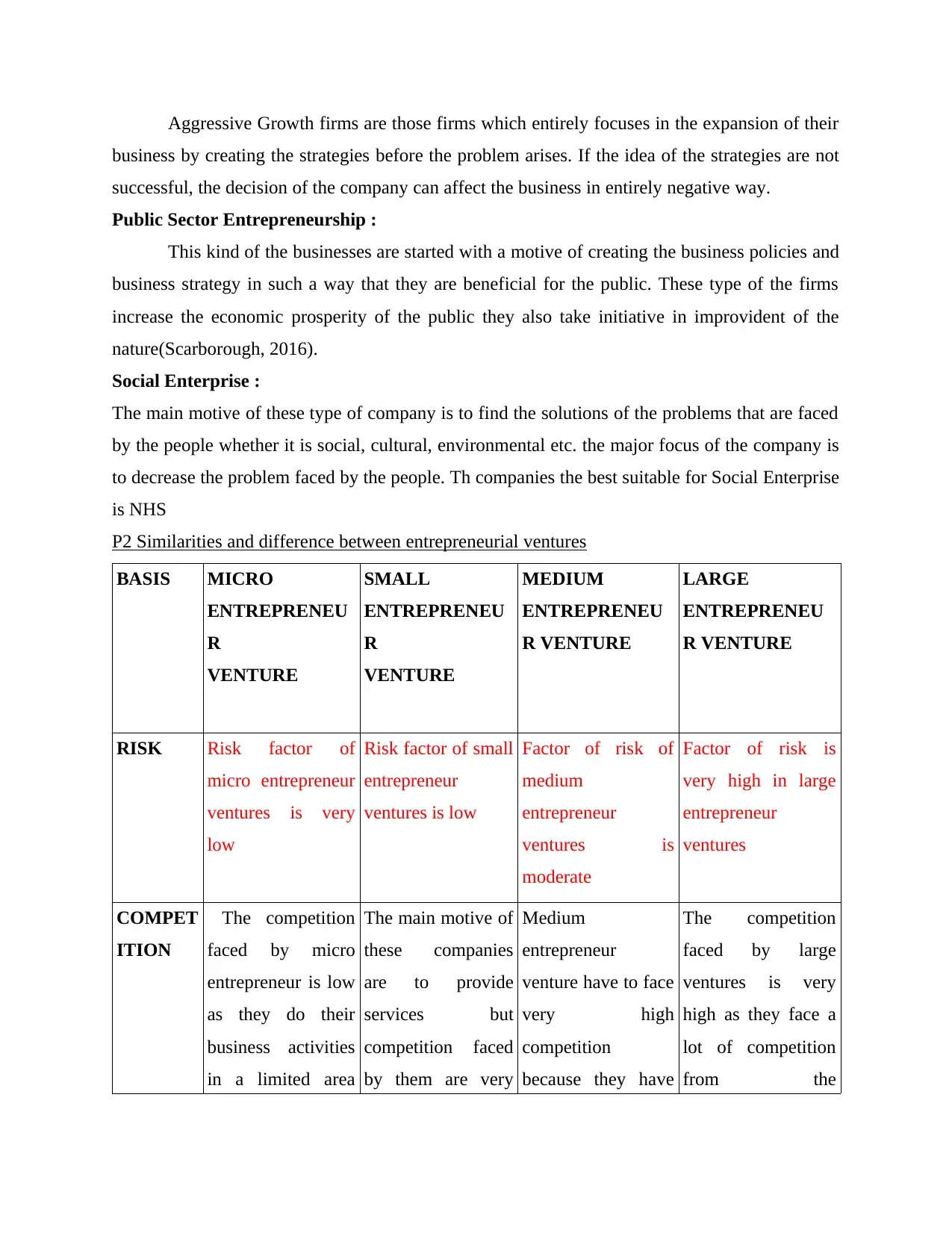
Aggressive Growth firms are those firms which entirely focuses in the expansion of their
business by creating the strategies before the problem arises. If the idea of the strategies are not
successful, the decision of the company can affect the business in entirely negative way.
Public Sector Entrepreneurship :
This kind of the businesses are started with a motive of creating the business policies and
business strategy in such a way that they are beneficial for the public. These type of the firms
increase the economic prosperity of the public they also take initiative in improvident of the
nature(Scarborough, 2016).
Social Enterprise :
The main motive of these type of company is to find the solutions of the problems that are faced
by the people whether it is social, cultural, environmental etc. the major focus of the company is
to decrease the problem faced by the people. Th companies the best suitable for Social Enterprise
is NHS
P2 Similarities and difference between entrepreneurial ventures
BASIS MICRO
ENTREPRENEU
R
VENTURE
SMALL
ENTREPRENEU
R
VENTURE
MEDIUM
ENTREPRENEU
R VENTURE
LARGE
ENTREPRENEU
R VENTURE
RISK Risk factor of
micro entrepreneur
ventures is very
low
Risk factor of small
entrepreneur
ventures is low
Factor of risk of
medium
entrepreneur
ventures is
moderate
Factor of risk is
very high in large
entrepreneur
ventures
COMPET
ITION
The competition
faced by micro
entrepreneur is low
as they do their
business activities
in a limited area
The main motive of
these companies
are to provide
services but
competition faced
by them are very
Medium
entrepreneur
venture have to face
very high
competition
because they have
The competition
faced by large
ventures is very
high as they face a
lot of competition
from the
business by creating the strategies before the problem arises. If the idea of the strategies are not
successful, the decision of the company can affect the business in entirely negative way.
Public Sector Entrepreneurship :
This kind of the businesses are started with a motive of creating the business policies and
business strategy in such a way that they are beneficial for the public. These type of the firms
increase the economic prosperity of the public they also take initiative in improvident of the
nature(Scarborough, 2016).
Social Enterprise :
The main motive of these type of company is to find the solutions of the problems that are faced
by the people whether it is social, cultural, environmental etc. the major focus of the company is
to decrease the problem faced by the people. Th companies the best suitable for Social Enterprise
is NHS
P2 Similarities and difference between entrepreneurial ventures
BASIS MICRO
ENTREPRENEU
R
VENTURE
SMALL
ENTREPRENEU
R
VENTURE
MEDIUM
ENTREPRENEU
R VENTURE
LARGE
ENTREPRENEU
R VENTURE
RISK Risk factor of
micro entrepreneur
ventures is very
low
Risk factor of small
entrepreneur
ventures is low
Factor of risk of
medium
entrepreneur
ventures is
moderate
Factor of risk is
very high in large
entrepreneur
ventures
COMPET
ITION
The competition
faced by micro
entrepreneur is low
as they do their
business activities
in a limited area
The main motive of
these companies
are to provide
services but
competition faced
by them are very
Medium
entrepreneur
venture have to face
very high
competition
because they have
The competition
faced by large
ventures is very
high as they face a
lot of competition
from the
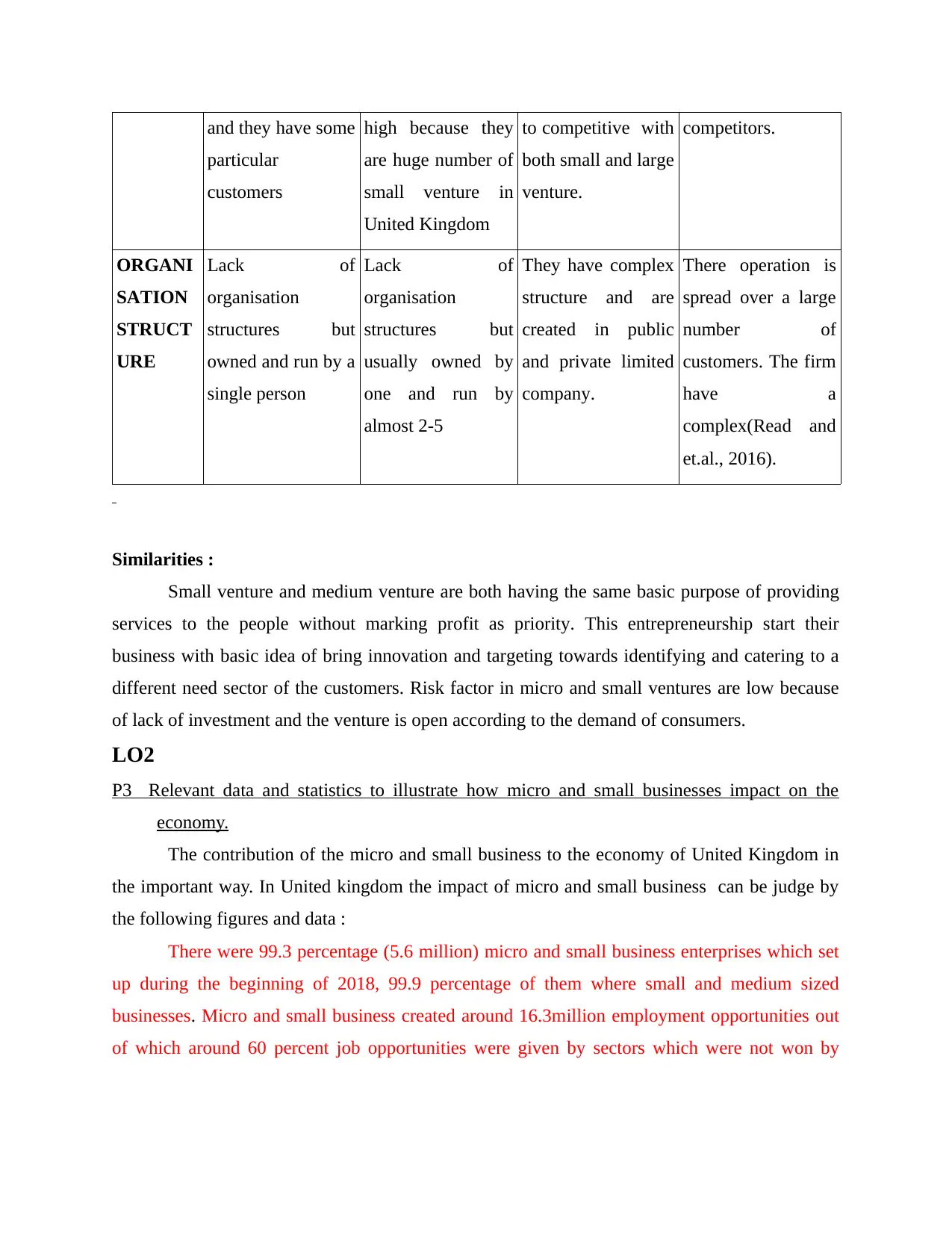
and they have some
particular
customers
high because they
are huge number of
small venture in
United Kingdom
to competitive with
both small and large
venture.
competitors.
ORGANI
SATION
STRUCT
URE
Lack of
organisation
structures but
owned and run by a
single person
Lack of
organisation
structures but
usually owned by
one and run by
almost 2-5
They have complex
structure and are
created in public
and private limited
company.
There operation is
spread over a large
number of
customers. The firm
have a
complex(Read and
et.al., 2016).
Similarities :
Small venture and medium venture are both having the same basic purpose of providing
services to the people without marking profit as priority. This entrepreneurship start their
business with basic idea of bring innovation and targeting towards identifying and catering to a
different need sector of the customers. Risk factor in micro and small ventures are low because
of lack of investment and the venture is open according to the demand of consumers.
LO2
P3 Relevant data and statistics to illustrate how micro and small businesses impact on the
economy.
The contribution of the micro and small business to the economy of United Kingdom in
the important way. In United kingdom the impact of micro and small business can be judge by
the following figures and data :
There were 99.3 percentage (5.6 million) micro and small business enterprises which set
up during the beginning of 2018, 99.9 percentage of them where small and medium sized
businesses. Micro and small business created around 16.3million employment opportunities out
of which around 60 percent job opportunities were given by sectors which were not won by
particular
customers
high because they
are huge number of
small venture in
United Kingdom
to competitive with
both small and large
venture.
competitors.
ORGANI
SATION
STRUCT
URE
Lack of
organisation
structures but
owned and run by a
single person
Lack of
organisation
structures but
usually owned by
one and run by
almost 2-5
They have complex
structure and are
created in public
and private limited
company.
There operation is
spread over a large
number of
customers. The firm
have a
complex(Read and
et.al., 2016).
Similarities :
Small venture and medium venture are both having the same basic purpose of providing
services to the people without marking profit as priority. This entrepreneurship start their
business with basic idea of bring innovation and targeting towards identifying and catering to a
different need sector of the customers. Risk factor in micro and small ventures are low because
of lack of investment and the venture is open according to the demand of consumers.
LO2
P3 Relevant data and statistics to illustrate how micro and small businesses impact on the
economy.
The contribution of the micro and small business to the economy of United Kingdom in
the important way. In United kingdom the impact of micro and small business can be judge by
the following figures and data :
There were 99.3 percentage (5.6 million) micro and small business enterprises which set
up during the beginning of 2018, 99.9 percentage of them where small and medium sized
businesses. Micro and small business created around 16.3million employment opportunities out
of which around 60 percent job opportunities were given by sectors which were not won by
⊘ This is a preview!⊘
Do you want full access?
Subscribe today to unlock all pages.

Trusted by 1+ million students worldwide
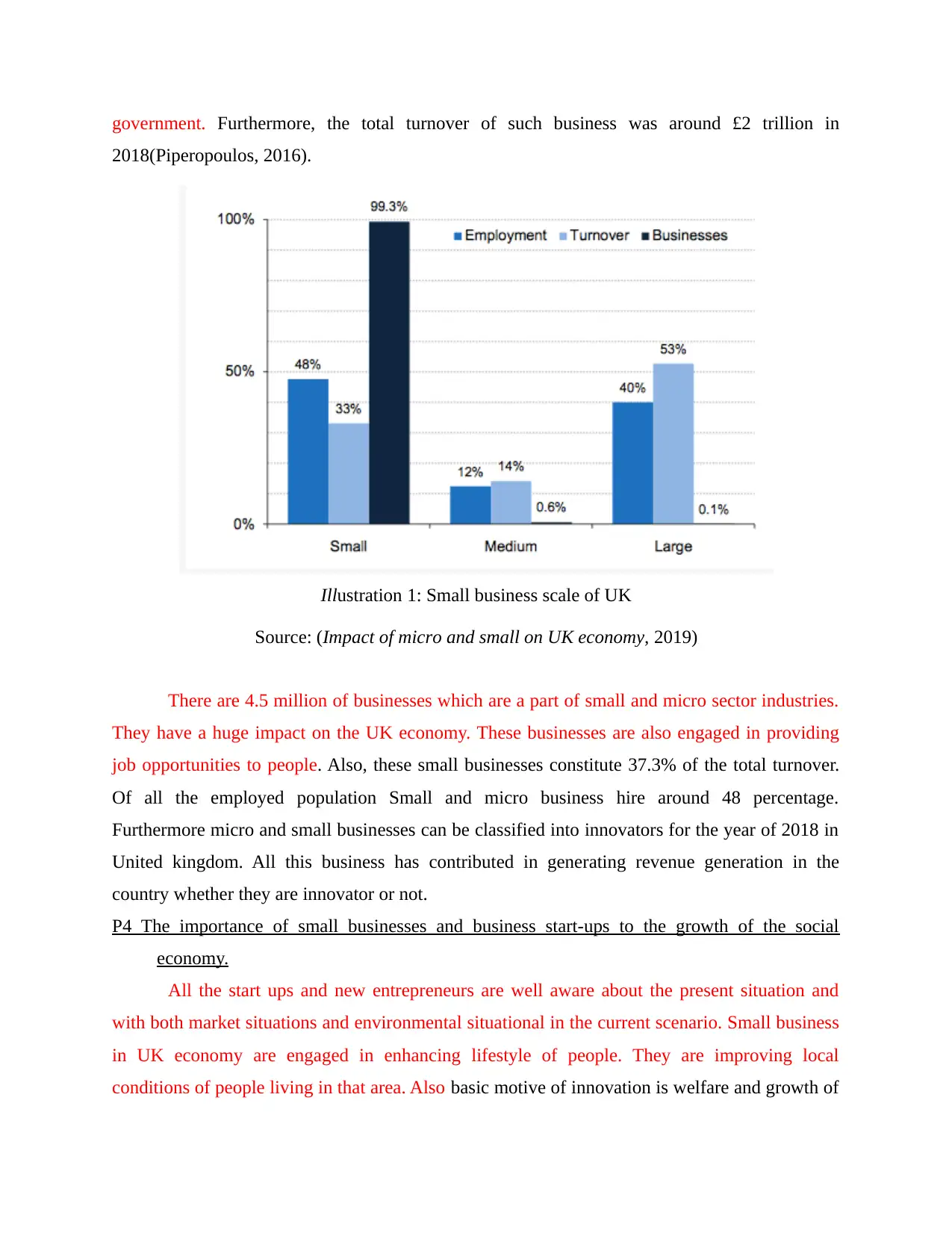
government. Furthermore, the total turnover of such business was around £2 trillion in
2018(Piperopoulos, 2016).
There are 4.5 million of businesses which are a part of small and micro sector industries.
They have a huge impact on the UK economy. These businesses are also engaged in providing
job opportunities to people. Also, these small businesses constitute 37.3% of the total turnover.
Of all the employed population Small and micro business hire around 48 percentage.
Furthermore micro and small businesses can be classified into innovators for the year of 2018 in
United kingdom. All this business has contributed in generating revenue generation in the
country whether they are innovator or not.
P4 The importance of small businesses and business start-ups to the growth of the social
economy.
All the start ups and new entrepreneurs are well aware about the present situation and
with both market situations and environmental situational in the current scenario. Small business
in UK economy are engaged in enhancing lifestyle of people. They are improving local
conditions of people living in that area. Also basic motive of innovation is welfare and growth of
Illustration 1: Small business scale of UK
Source: (Impact of micro and small on UK economy, 2019)
2018(Piperopoulos, 2016).
There are 4.5 million of businesses which are a part of small and micro sector industries.
They have a huge impact on the UK economy. These businesses are also engaged in providing
job opportunities to people. Also, these small businesses constitute 37.3% of the total turnover.
Of all the employed population Small and micro business hire around 48 percentage.
Furthermore micro and small businesses can be classified into innovators for the year of 2018 in
United kingdom. All this business has contributed in generating revenue generation in the
country whether they are innovator or not.
P4 The importance of small businesses and business start-ups to the growth of the social
economy.
All the start ups and new entrepreneurs are well aware about the present situation and
with both market situations and environmental situational in the current scenario. Small business
in UK economy are engaged in enhancing lifestyle of people. They are improving local
conditions of people living in that area. Also basic motive of innovation is welfare and growth of
Illustration 1: Small business scale of UK
Source: (Impact of micro and small on UK economy, 2019)
Paraphrase This Document
Need a fresh take? Get an instant paraphrase of this document with our AI Paraphraser
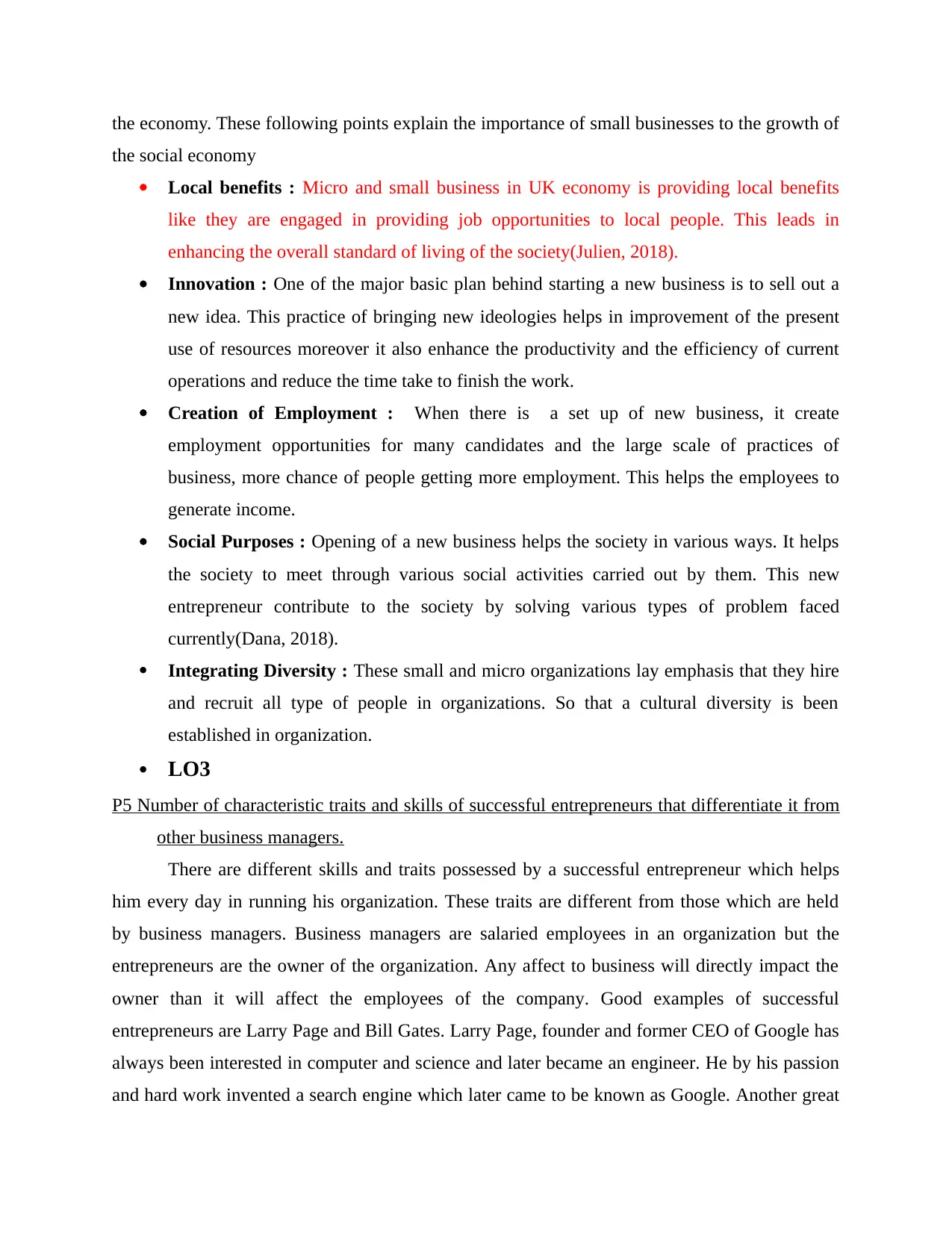
the economy. These following points explain the importance of small businesses to the growth of
the social economy
Local benefits : Micro and small business in UK economy is providing local benefits
like they are engaged in providing job opportunities to local people. This leads in
enhancing the overall standard of living of the society(Julien, 2018).
Innovation : One of the major basic plan behind starting a new business is to sell out a
new idea. This practice of bringing new ideologies helps in improvement of the present
use of resources moreover it also enhance the productivity and the efficiency of current
operations and reduce the time take to finish the work.
Creation of Employment : When there is a set up of new business, it create
employment opportunities for many candidates and the large scale of practices of
business, more chance of people getting more employment. This helps the employees to
generate income.
Social Purposes : Opening of a new business helps the society in various ways. It helps
the society to meet through various social activities carried out by them. This new
entrepreneur contribute to the society by solving various types of problem faced
currently(Dana, 2018).
Integrating Diversity : These small and micro organizations lay emphasis that they hire
and recruit all type of people in organizations. So that a cultural diversity is been
established in organization.
LO3
P5 Number of characteristic traits and skills of successful entrepreneurs that differentiate it from
other business managers.
There are different skills and traits possessed by a successful entrepreneur which helps
him every day in running his organization. These traits are different from those which are held
by business managers. Business managers are salaried employees in an organization but the
entrepreneurs are the owner of the organization. Any affect to business will directly impact the
owner than it will affect the employees of the company. Good examples of successful
entrepreneurs are Larry Page and Bill Gates. Larry Page, founder and former CEO of Google has
always been interested in computer and science and later became an engineer. He by his passion
and hard work invented a search engine which later came to be known as Google. Another great
the social economy
Local benefits : Micro and small business in UK economy is providing local benefits
like they are engaged in providing job opportunities to local people. This leads in
enhancing the overall standard of living of the society(Julien, 2018).
Innovation : One of the major basic plan behind starting a new business is to sell out a
new idea. This practice of bringing new ideologies helps in improvement of the present
use of resources moreover it also enhance the productivity and the efficiency of current
operations and reduce the time take to finish the work.
Creation of Employment : When there is a set up of new business, it create
employment opportunities for many candidates and the large scale of practices of
business, more chance of people getting more employment. This helps the employees to
generate income.
Social Purposes : Opening of a new business helps the society in various ways. It helps
the society to meet through various social activities carried out by them. This new
entrepreneur contribute to the society by solving various types of problem faced
currently(Dana, 2018).
Integrating Diversity : These small and micro organizations lay emphasis that they hire
and recruit all type of people in organizations. So that a cultural diversity is been
established in organization.
LO3
P5 Number of characteristic traits and skills of successful entrepreneurs that differentiate it from
other business managers.
There are different skills and traits possessed by a successful entrepreneur which helps
him every day in running his organization. These traits are different from those which are held
by business managers. Business managers are salaried employees in an organization but the
entrepreneurs are the owner of the organization. Any affect to business will directly impact the
owner than it will affect the employees of the company. Good examples of successful
entrepreneurs are Larry Page and Bill Gates. Larry Page, founder and former CEO of Google has
always been interested in computer and science and later became an engineer. He by his passion
and hard work invented a search engine which later came to be known as Google. Another great
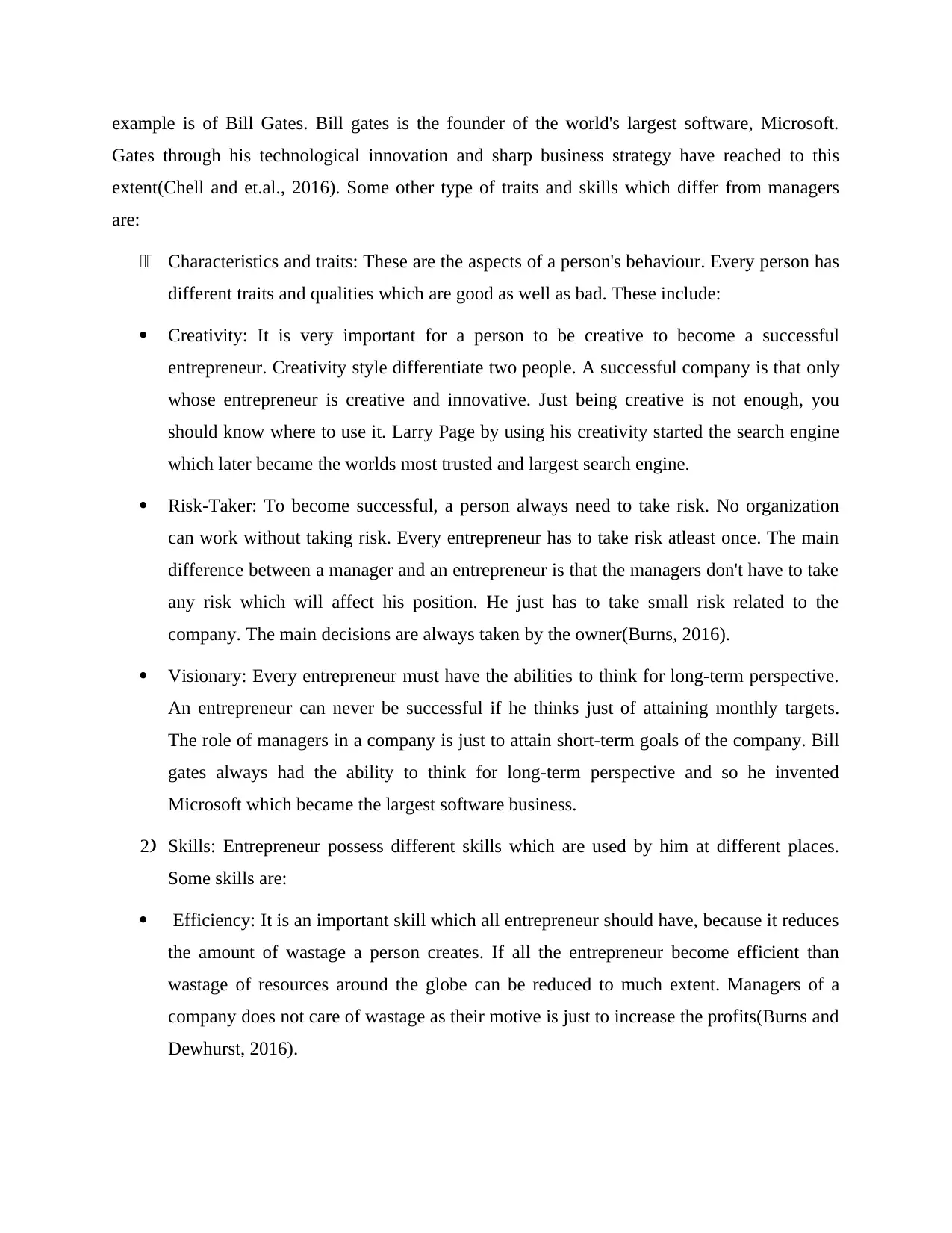
example is of Bill Gates. Bill gates is the founder of the world's largest software, Microsoft.
Gates through his technological innovation and sharp business strategy have reached to this
extent(Chell and et.al., 2016). Some other type of traits and skills which differ from managers
are:
11 Characteristics and traits: These are the aspects of a person's behaviour. Every person has
different traits and qualities which are good as well as bad. These include:
Creativity: It is very important for a person to be creative to become a successful
entrepreneur. Creativity style differentiate two people. A successful company is that only
whose entrepreneur is creative and innovative. Just being creative is not enough, you
should know where to use it. Larry Page by using his creativity started the search engine
which later became the worlds most trusted and largest search engine.
Risk-Taker: To become successful, a person always need to take risk. No organization
can work without taking risk. Every entrepreneur has to take risk atleast once. The main
difference between a manager and an entrepreneur is that the managers don't have to take
any risk which will affect his position. He just has to take small risk related to the
company. The main decisions are always taken by the owner(Burns, 2016).
Visionary: Every entrepreneur must have the abilities to think for long-term perspective.
An entrepreneur can never be successful if he thinks just of attaining monthly targets.
The role of managers in a company is just to attain short-term goals of the company. Bill
gates always had the ability to think for long-term perspective and so he invented
Microsoft which became the largest software business.
2) Skills: Entrepreneur possess different skills which are used by him at different places.
Some skills are:
Efficiency: It is an important skill which all entrepreneur should have, because it reduces
the amount of wastage a person creates. If all the entrepreneur become efficient than
wastage of resources around the globe can be reduced to much extent. Managers of a
company does not care of wastage as their motive is just to increase the profits(Burns and
Dewhurst, 2016).
Gates through his technological innovation and sharp business strategy have reached to this
extent(Chell and et.al., 2016). Some other type of traits and skills which differ from managers
are:
11 Characteristics and traits: These are the aspects of a person's behaviour. Every person has
different traits and qualities which are good as well as bad. These include:
Creativity: It is very important for a person to be creative to become a successful
entrepreneur. Creativity style differentiate two people. A successful company is that only
whose entrepreneur is creative and innovative. Just being creative is not enough, you
should know where to use it. Larry Page by using his creativity started the search engine
which later became the worlds most trusted and largest search engine.
Risk-Taker: To become successful, a person always need to take risk. No organization
can work without taking risk. Every entrepreneur has to take risk atleast once. The main
difference between a manager and an entrepreneur is that the managers don't have to take
any risk which will affect his position. He just has to take small risk related to the
company. The main decisions are always taken by the owner(Burns, 2016).
Visionary: Every entrepreneur must have the abilities to think for long-term perspective.
An entrepreneur can never be successful if he thinks just of attaining monthly targets.
The role of managers in a company is just to attain short-term goals of the company. Bill
gates always had the ability to think for long-term perspective and so he invented
Microsoft which became the largest software business.
2) Skills: Entrepreneur possess different skills which are used by him at different places.
Some skills are:
Efficiency: It is an important skill which all entrepreneur should have, because it reduces
the amount of wastage a person creates. If all the entrepreneur become efficient than
wastage of resources around the globe can be reduced to much extent. Managers of a
company does not care of wastage as their motive is just to increase the profits(Burns and
Dewhurst, 2016).
⊘ This is a preview!⊘
Do you want full access?
Subscribe today to unlock all pages.

Trusted by 1+ million students worldwide
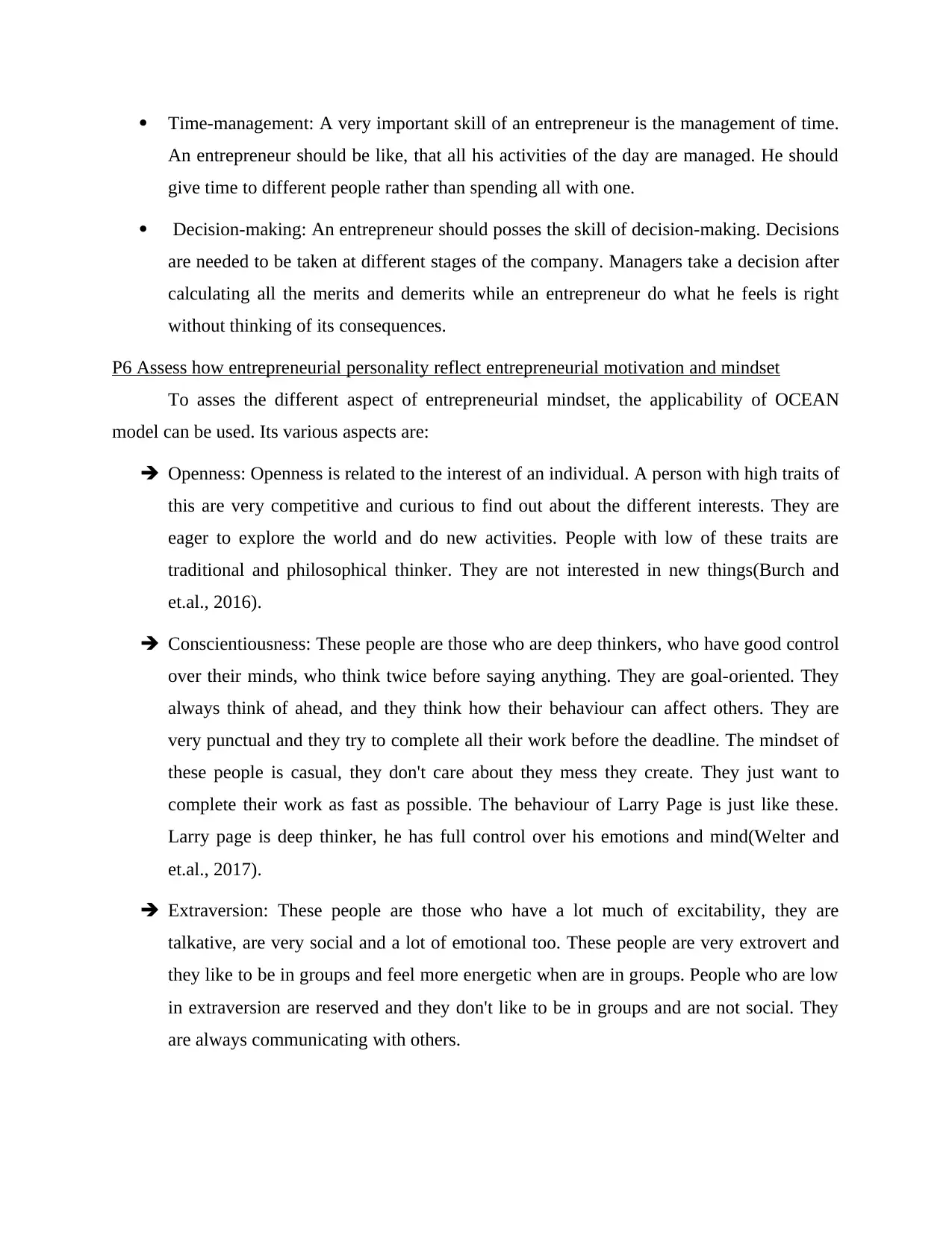
Time-management: A very important skill of an entrepreneur is the management of time.
An entrepreneur should be like, that all his activities of the day are managed. He should
give time to different people rather than spending all with one.
Decision-making: An entrepreneur should posses the skill of decision-making. Decisions
are needed to be taken at different stages of the company. Managers take a decision after
calculating all the merits and demerits while an entrepreneur do what he feels is right
without thinking of its consequences.
P6 Assess how entrepreneurial personality reflect entrepreneurial motivation and mindset
To asses the different aspect of entrepreneurial mindset, the applicability of OCEAN
model can be used. Its various aspects are:
Openness: Openness is related to the interest of an individual. A person with high traits of
this are very competitive and curious to find out about the different interests. They are
eager to explore the world and do new activities. People with low of these traits are
traditional and philosophical thinker. They are not interested in new things(Burch and
et.al., 2016).
Conscientiousness: These people are those who are deep thinkers, who have good control
over their minds, who think twice before saying anything. They are goal-oriented. They
always think of ahead, and they think how their behaviour can affect others. They are
very punctual and they try to complete all their work before the deadline. The mindset of
these people is casual, they don't care about they mess they create. They just want to
complete their work as fast as possible. The behaviour of Larry Page is just like these.
Larry page is deep thinker, he has full control over his emotions and mind(Welter and
et.al., 2017).
Extraversion: These people are those who have a lot much of excitability, they are
talkative, are very social and a lot of emotional too. These people are very extrovert and
they like to be in groups and feel more energetic when are in groups. People who are low
in extraversion are reserved and they don't like to be in groups and are not social. They
are always communicating with others.
An entrepreneur should be like, that all his activities of the day are managed. He should
give time to different people rather than spending all with one.
Decision-making: An entrepreneur should posses the skill of decision-making. Decisions
are needed to be taken at different stages of the company. Managers take a decision after
calculating all the merits and demerits while an entrepreneur do what he feels is right
without thinking of its consequences.
P6 Assess how entrepreneurial personality reflect entrepreneurial motivation and mindset
To asses the different aspect of entrepreneurial mindset, the applicability of OCEAN
model can be used. Its various aspects are:
Openness: Openness is related to the interest of an individual. A person with high traits of
this are very competitive and curious to find out about the different interests. They are
eager to explore the world and do new activities. People with low of these traits are
traditional and philosophical thinker. They are not interested in new things(Burch and
et.al., 2016).
Conscientiousness: These people are those who are deep thinkers, who have good control
over their minds, who think twice before saying anything. They are goal-oriented. They
always think of ahead, and they think how their behaviour can affect others. They are
very punctual and they try to complete all their work before the deadline. The mindset of
these people is casual, they don't care about they mess they create. They just want to
complete their work as fast as possible. The behaviour of Larry Page is just like these.
Larry page is deep thinker, he has full control over his emotions and mind(Welter and
et.al., 2017).
Extraversion: These people are those who have a lot much of excitability, they are
talkative, are very social and a lot of emotional too. These people are very extrovert and
they like to be in groups and feel more energetic when are in groups. People who are low
in extraversion are reserved and they don't like to be in groups and are not social. They
are always communicating with others.
Paraphrase This Document
Need a fresh take? Get an instant paraphrase of this document with our AI Paraphraser
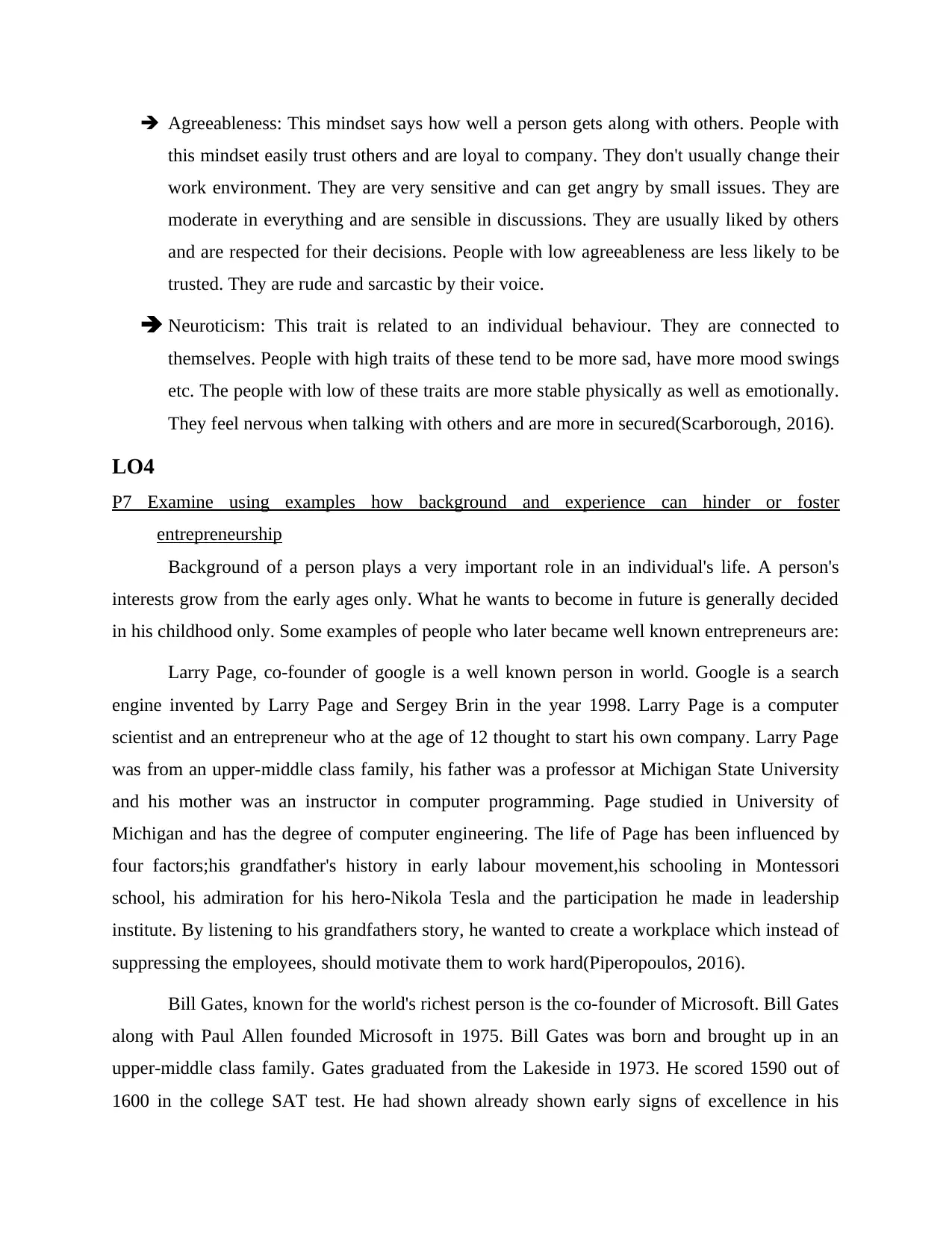
Agreeableness: This mindset says how well a person gets along with others. People with
this mindset easily trust others and are loyal to company. They don't usually change their
work environment. They are very sensitive and can get angry by small issues. They are
moderate in everything and are sensible in discussions. They are usually liked by others
and are respected for their decisions. People with low agreeableness are less likely to be
trusted. They are rude and sarcastic by their voice.
Neuroticism: This trait is related to an individual behaviour. They are connected to
themselves. People with high traits of these tend to be more sad, have more mood swings
etc. The people with low of these traits are more stable physically as well as emotionally.
They feel nervous when talking with others and are more in secured(Scarborough, 2016).
LO4
P7 Examine using examples how background and experience can hinder or foster
entrepreneurship
Background of a person plays a very important role in an individual's life. A person's
interests grow from the early ages only. What he wants to become in future is generally decided
in his childhood only. Some examples of people who later became well known entrepreneurs are:
Larry Page, co-founder of google is a well known person in world. Google is a search
engine invented by Larry Page and Sergey Brin in the year 1998. Larry Page is a computer
scientist and an entrepreneur who at the age of 12 thought to start his own company. Larry Page
was from an upper-middle class family, his father was a professor at Michigan State University
and his mother was an instructor in computer programming. Page studied in University of
Michigan and has the degree of computer engineering. The life of Page has been influenced by
four factors;his grandfather's history in early labour movement,his schooling in Montessori
school, his admiration for his hero-Nikola Tesla and the participation he made in leadership
institute. By listening to his grandfathers story, he wanted to create a workplace which instead of
suppressing the employees, should motivate them to work hard(Piperopoulos, 2016).
Bill Gates, known for the world's richest person is the co-founder of Microsoft. Bill Gates
along with Paul Allen founded Microsoft in 1975. Bill Gates was born and brought up in an
upper-middle class family. Gates graduated from the Lakeside in 1973. He scored 1590 out of
1600 in the college SAT test. He had shown already shown early signs of excellence in his
this mindset easily trust others and are loyal to company. They don't usually change their
work environment. They are very sensitive and can get angry by small issues. They are
moderate in everything and are sensible in discussions. They are usually liked by others
and are respected for their decisions. People with low agreeableness are less likely to be
trusted. They are rude and sarcastic by their voice.
Neuroticism: This trait is related to an individual behaviour. They are connected to
themselves. People with high traits of these tend to be more sad, have more mood swings
etc. The people with low of these traits are more stable physically as well as emotionally.
They feel nervous when talking with others and are more in secured(Scarborough, 2016).
LO4
P7 Examine using examples how background and experience can hinder or foster
entrepreneurship
Background of a person plays a very important role in an individual's life. A person's
interests grow from the early ages only. What he wants to become in future is generally decided
in his childhood only. Some examples of people who later became well known entrepreneurs are:
Larry Page, co-founder of google is a well known person in world. Google is a search
engine invented by Larry Page and Sergey Brin in the year 1998. Larry Page is a computer
scientist and an entrepreneur who at the age of 12 thought to start his own company. Larry Page
was from an upper-middle class family, his father was a professor at Michigan State University
and his mother was an instructor in computer programming. Page studied in University of
Michigan and has the degree of computer engineering. The life of Page has been influenced by
four factors;his grandfather's history in early labour movement,his schooling in Montessori
school, his admiration for his hero-Nikola Tesla and the participation he made in leadership
institute. By listening to his grandfathers story, he wanted to create a workplace which instead of
suppressing the employees, should motivate them to work hard(Piperopoulos, 2016).
Bill Gates, known for the world's richest person is the co-founder of Microsoft. Bill Gates
along with Paul Allen founded Microsoft in 1975. Bill Gates was born and brought up in an
upper-middle class family. Gates graduated from the Lakeside in 1973. He scored 1590 out of
1600 in the college SAT test. He had shown already shown early signs of excellence in his
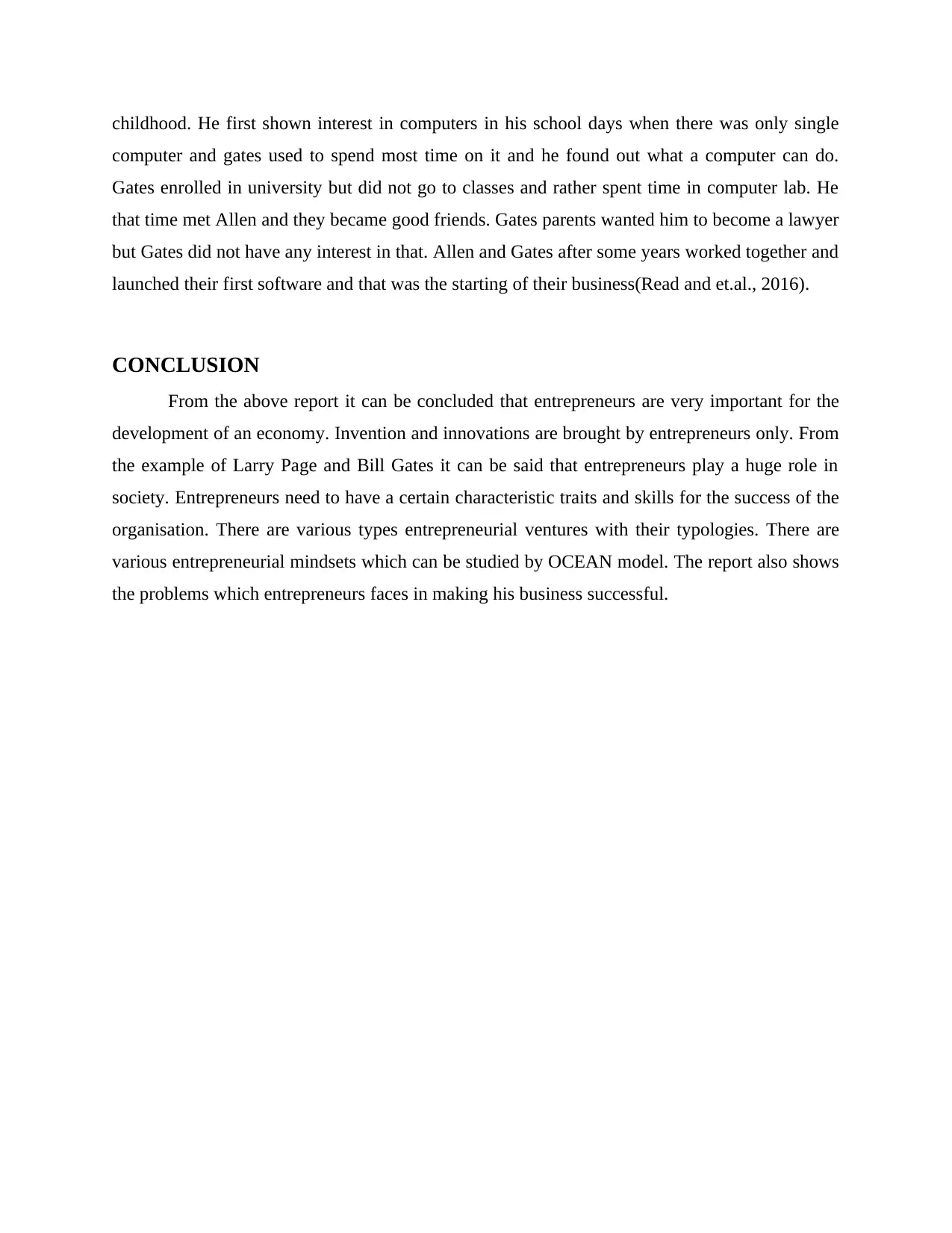
childhood. He first shown interest in computers in his school days when there was only single
computer and gates used to spend most time on it and he found out what a computer can do.
Gates enrolled in university but did not go to classes and rather spent time in computer lab. He
that time met Allen and they became good friends. Gates parents wanted him to become a lawyer
but Gates did not have any interest in that. Allen and Gates after some years worked together and
launched their first software and that was the starting of their business(Read and et.al., 2016).
CONCLUSION
From the above report it can be concluded that entrepreneurs are very important for the
development of an economy. Invention and innovations are brought by entrepreneurs only. From
the example of Larry Page and Bill Gates it can be said that entrepreneurs play a huge role in
society. Entrepreneurs need to have a certain characteristic traits and skills for the success of the
organisation. There are various types entrepreneurial ventures with their typologies. There are
various entrepreneurial mindsets which can be studied by OCEAN model. The report also shows
the problems which entrepreneurs faces in making his business successful.
computer and gates used to spend most time on it and he found out what a computer can do.
Gates enrolled in university but did not go to classes and rather spent time in computer lab. He
that time met Allen and they became good friends. Gates parents wanted him to become a lawyer
but Gates did not have any interest in that. Allen and Gates after some years worked together and
launched their first software and that was the starting of their business(Read and et.al., 2016).
CONCLUSION
From the above report it can be concluded that entrepreneurs are very important for the
development of an economy. Invention and innovations are brought by entrepreneurs only. From
the example of Larry Page and Bill Gates it can be said that entrepreneurs play a huge role in
society. Entrepreneurs need to have a certain characteristic traits and skills for the success of the
organisation. There are various types entrepreneurial ventures with their typologies. There are
various entrepreneurial mindsets which can be studied by OCEAN model. The report also shows
the problems which entrepreneurs faces in making his business successful.
⊘ This is a preview!⊘
Do you want full access?
Subscribe today to unlock all pages.

Trusted by 1+ million students worldwide
1 out of 15
Related Documents
Your All-in-One AI-Powered Toolkit for Academic Success.
+13062052269
info@desklib.com
Available 24*7 on WhatsApp / Email
![[object Object]](/_next/static/media/star-bottom.7253800d.svg)
Unlock your academic potential
Copyright © 2020–2026 A2Z Services. All Rights Reserved. Developed and managed by ZUCOL.





